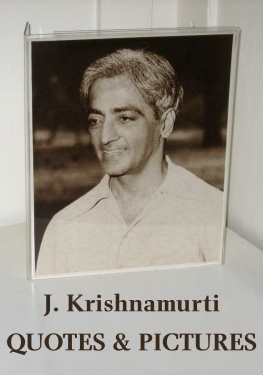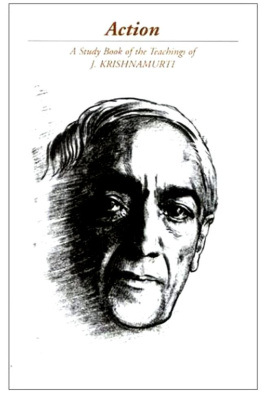Krishnamurti - Quotes and Pictures
Here you can read online Krishnamurti - Quotes and Pictures full text of the book (entire story) in english for free. Download pdf and epub, get meaning, cover and reviews about this ebook. publisher: Krishnamurti Foundations, genre: Religion. Description of the work, (preface) as well as reviews are available. Best literature library LitArk.com created for fans of good reading and offers a wide selection of genres:
Romance novel
Science fiction
Adventure
Detective
Science
History
Home and family
Prose
Art
Politics
Computer
Non-fiction
Religion
Business
Children
Humor
Choose a favorite category and find really read worthwhile books. Enjoy immersion in the world of imagination, feel the emotions of the characters or learn something new for yourself, make an fascinating discovery.
- Book:Quotes and Pictures
- Author:
- Publisher:Krishnamurti Foundations
- Genre:
- Rating:4 / 5
- Favourites:Add to favourites
- Your mark:
- 80
- 1
- 2
- 3
- 4
- 5
Quotes and Pictures: summary, description and annotation
We offer to read an annotation, description, summary or preface (depends on what the author of the book "Quotes and Pictures" wrote himself). If you haven't found the necessary information about the book — write in the comments, we will try to find it.
Quotes and Pictures — read online for free the complete book (whole text) full work
Below is the text of the book, divided by pages. System saving the place of the last page read, allows you to conveniently read the book "Quotes and Pictures" online for free, without having to search again every time where you left off. Put a bookmark, and you can go to the page where you finished reading at any time.
Font size:
Interval:
Bookmark:
Quotes and Pictures
Copyright Krishnamurti Foundations
J. Krishnamurti
Quotes and Pictures
Contents


THE CORE OF THE TEACHINGS
The following statement was written by Krishnamurti himself on October 21, 1980. It may be copied and used provided this is done in its entirety. No editing or change of any kind is permitted. No extracts may be used.
The core of Krishnamurtis teaching is contained in the statement he made in 1929 when he said: Truth is a pathless land. Man cannot come to it through any organization, through any creed, through any dogma, priest or ritual, not through any philosophic knowledge or psychological technique. He has to find it through the mirror of relationship, through the understanding of the contents of his own mind, through observation and not through intellectual analysis or introspective dissection.
Man has built in himself images as a fence of securityreligious, political, personal. These manifest as symbols, ideas, beliefs. The burden of these images dominates mans thinking, his relationships and his daily life. These images are the causes of our problems for they divide man from man. His perception of life is shaped by the concepts already established in his mind.
The content of his consciousness is his entire existence. This content is common to all humanity. The individuality is the name, the form and superficial culture he acquires from tradition and environment. The uniqueness of man does not lie in the superficial but in complete freedom from the content of his consciousness, which is common to all mankind. So he is not an individual.
Freedom is not a reaction; freedom is not a choice. It is mans pretence that because he has choice he is free. Freedom is pure observation without direction, without fear of punishment and reward. Freedom is without motive; freedom is not at the end of the evolution of man but lies in the first step of his existence. In observation one begins to discover the lack of freedom. Freedom is found in the choiceless awareness of our daily existence and activity. Thought is time. Thought is born of experience and knowledge which are inseparable from time and the past. Time is the psychological enemy of man. Our action is based on knowledge and therefore time, so man is always a slave to the past. Thought is ever-limited and so we live in constant conflict and struggle. There is no psychological evolution.
When man becomes aware of the movement of his own thoughts he will see the division between the thinker and thought, the observer and the observed, the experiencer and the experience. He will discover that this division is an illusion. Then only is there pure observation which is insight without any shadow of the past or of time. This timeless insight brings about a deep radical mutation in the mind.
Total negation is the essence of the positive. When there is negation of all those things that thought has brought about psychologically, only then is there love, which is compassion and intelligence.

A BRIEF BIO
Friend, do not concern yourself with who I am; you will never know. I do not want you to accept anything I say. I do not want anything from any of you; I do not desire popularity; I do not want your flattery, your following. Because I am in love with life, I do not want anything. These questions are not of very great importance; what is of importance is the fact that you obey and allow your judgment to be perverted by authority. Your judgment, your mind, your affection, your life are being perverted by things which have no value, and herein lies sorrow.
Early Talks, 1930
Krishnamurti was born in Mandanapalle, South India on May 12, 1895 and died on February 17, 1986 in Ojai, California, at the age of ninety.

ACTION
...action as we know it is really reaction, it is a ceaseless becoming, which is the denial, the avoidance of what is...
The idea of becoming arises only when there is a sense of insecurity, and that sense of insecurity comes when one is aware of the inward void. If you are aware of that process of thought and feeling, you will see that there is a constant battle going on, an effort to change, to modify, to alter what is. This is the effort to become, and becoming is a direct avoidance of what is. Through self-knowledge, through constant awareness, you will find that strife, battle, the conflict of becoming, leads to pain, to sorrow and ignorance. It is only if you are aware of inward insufficiency and live with it without escape, accepting it wholly, that you will discover an extraordinary tranquillity, a tranquillity which is not put together, made up, but a tranquillity which comes with understanding of what is. Only in that state of tranquillity is there creative being.
The First and Last Freedom
...when the mind seeks a timeless spiritual state which will go into action in order to destroy the self, is that not another form of experience which is strengthening the me?...The self has projected that thing which you feel and believe will come and destroy the self.
...Thus our action from the beginning to the end is the same action, only we think it is evolving, growing, becoming more and more beautiful; but, if you observe inwardly, it is the same action going on, the same me functioning at different levels with different labels, different names.
When you see the whole process, the cunning, extraordinary inventions, the intelligence of the self, how it covers itself up through identification, through virtue, through experience, through belief, through knowledge; when you see that the mind is moving in a circle, in a cage of its own making, what happens? When you are aware of it, fully cognizant of it, then are you not extraordinarily quietnot through compulsion, not through any reward, not through any fear?
The First and Last Freedom
Our actionwhat we want to do or beis based on idea, is it not? That is all we know; we have ideas, ideals, promises, various formulas as to what we are and what we are not. The basis of our action is reward in the future or fear of punishment.
The First and Last Freedom
Between action and idea, there is a gulf, a division, there is a time process. That is so, is it not? In other words, I am not charitable, I am not loving, there is no forgiveness in my heart but I feel I must be charitable. So there is a gap, between what I am and what I should be; we are all the time trying to bridge the gap. That is our activity, is it not?
Now what would happen if the idea did not exist? At one stroke, you would have removed the gap, would you not?
The First and Last Freedom
Action which transforms us as human beings, which brings regeneration, redemption, transformationcall it what you willsuch action is not based on idea. It is action irrespective of the sequence of reward or punishment. Such action is timeless, because mind, which is the time process, the calculating process, the dividing, the isolating process, does not enter into it.
The First and Last Freedom
Idea may bring about a certain series of actions, but that is mere activity; and activity is wholly different from action. It is in this activity that one is caught; and when for some reason or other activity stops, then one feels lost and life becomes meaningless, empty. We are aware of this emptiness, consciously or unconsciously, and so idea and activity become all-important. We fill this emptiness with belief, and activity becomes an intoxicating necessity. For the sake of this activity, we will renounce; we will adjust ourselves to any inconvenience, to any illusion.
Next pageFont size:
Interval:
Bookmark:
Similar books «Quotes and Pictures»
Look at similar books to Quotes and Pictures. We have selected literature similar in name and meaning in the hope of providing readers with more options to find new, interesting, not yet read works.
Discussion, reviews of the book Quotes and Pictures and just readers' own opinions. Leave your comments, write what you think about the work, its meaning or the main characters. Specify what exactly you liked and what you didn't like, and why you think so.










